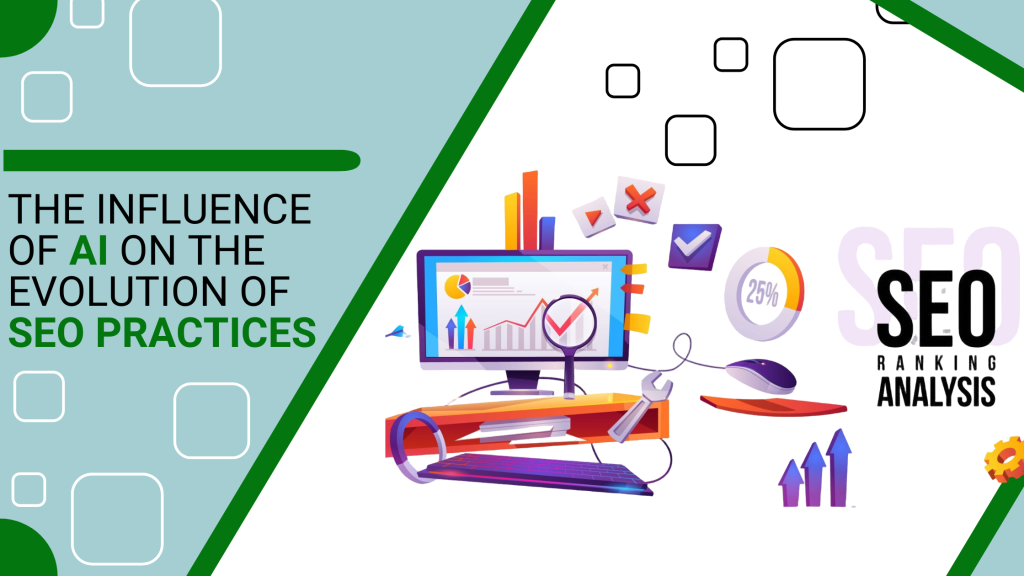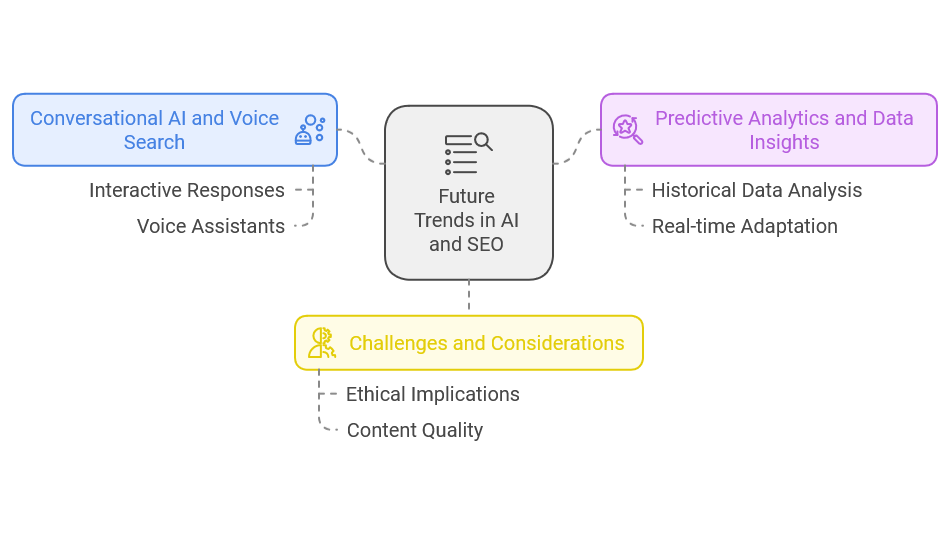Billions of people go to Google and other search engines to find solutions to their problems. As they research, they’re led to different pages with various contents.
But what people don’t realise is that there are plenty of AI tools working in the backend, determining what type of content to show or not show.
Search engines use AI tools to help users get to the right content at the right time.
And as AI algorithms expand, they can develop even greater competence in learning user intent, leading to more accurate results. This is a necessary transition to incorporate into your SEO techniques to keep up with the advancements of a fast-changing market.
Now, do you see the future of SEO with AI?



AI and search engines go way back from the earliest usage of algorithms to top search results based on keywords.
The decade was the ’90s, when Google’s PageRank algorithm was developed, highlighting a crucial milestone for search engines.
As artificial intelligence advances, machine-learning techniques are integrated into search engines to grasp user queries and provide answers more accurately.
As of late, there are plenty of AI-driven systems such as RankBrain that offer more precise searches, analysing the intentions behind phrases that are keyed in by the users rather than just aligning keywords.
These AI-driven methodologies can uncover semantic phrases easily missed by traditional keyword research methods, delivering convenient and personalised search experiences.
AI technologies power up search algorithms. Natural language processing and machine learning are employed to read large and complex data. By factoring user intent and behaviour, the search outcomes are greatly improved.
AI tools like BrightEdge, SEMrush and Surfer SEO are also leveraged to enhance SEO. These programmes can provide recommendations and guide content creators in crafting and marketing SEO-friendly content. They have built-in features like real-time data analysis and keyword-racking, allowing robust research for SEO optimisation.
Making strides from traditional SEO practises, AI encompasses real-time data analytics and personalised user experience.
From more structured articles to relevant keywords, here’s what it means to have AI in SEO:
Incorporating AI into search engines leads to profound search results. How so? Because AI does not rely on keywords to search. It uses natural language processing, which enhances the search performance.
NLP dives deep to understand user intent and behaviour instead of just matching keywords and identifying related terms and concepts. This allows it to produce more accurate and relevant search outcomes.
AI is lightning-quick. It can process, analyse and research data faster than you can blink with little human intervention.
AI-driven tools can streamline routine SEO tasks such as keyword research, data analysis and content optimisation. These programmes can search for trends, optimise content and track performance, freeing you and your SEO professional to work on strategic projects without compromising efficiency and accuracy.
Will AI replace humans in the workplace? Well, bots are not supposed to displace humans; they’re supposed to balance each other out to create a collaborative intelligence to make better work and strategic decisions.
Yes, AI can process vast amounts of data and give answers to questions in seconds. But what AI lacks is the human touch. AI models don’t have the emotional intelligence and nuances to comprehend complex patterns in a dynamic environment.
When you’re creating content that resonates with your audience, you need more than just speed and precision but deep awareness of human desires.
These are qualities that remain exclusive to real people. They have the creativity and understanding that gives them unique perspectives on content that aligns with customer needs and your business goals.
So, how can you work alongside AI to strengthen your SEO strategy?
You can use Al to optimise your content or conduct keyword research. These tools can speed up your writing process while you incorporate creativity and emotional acumen to shape the article. This makes your content more authentic and in sync with your brand.
Simply put, you’re collectively using the strengths of AI automation and human touch to enhance your content.
Bots are getting smarter, and they’re reshaping the digital landscape. In response, your SEO strategies must also evolve, so you can stay ahead in an AI-driven era.
Here’s what the future of SEO with AI entails:
AI-powered tools open an opportunity to enhance your search engine optimisation efforts. AIs provide a variety of functions for keyword research or performance tracking, allowing you to build content perfectly tailored to a specific market.
Some of the most popular AI-driven tools leveraged for SEO are as follows:
To integrate these tools into existing SEO workflows successfully, you can follow the steps below:
Why do user intent and personalisation matter when it comes to SEO? Because it is useful in creating relevant content. If you want to entice quality leads using SEO, you need to improve your content to match the search intent.
AI tools can be leveraged to analyse user intent. Through NLP, you can grasp the meaning behind every search term. Meanwhile, machine learning algorithms can monitor consumer behaviour, engagement, needs and preferences.
AI can cluster users based on intent, leading to more focused content and strategies.

Here’s a futuristic look at the trends of AI and SEO:
Conversational AIs are more interactive; thus, they can give precise answers directly to anyone looking for information.
People use voice assistants to order food or shop for presents online, making specific searches.
You can take advantage of this by optimising your page and crafting more conversational content for a more engaging experience.
Predictive analysis offers insights into what SEO campaigns can yield the best results simply by examining past data. Looking at historical records, you can refine areas that might fall short in real-time.
Data insights can help improve your campaigns, adapting them continuously to the evolving search behaviours and algorithm changes. This is important as these tweaks can impact your online presence.
As AI continues to impact our lives in so many ways, the inclusion of AI in content creation is becoming widespread. Everybody uses smart bots to connect with their audience and drive results.
However, we’re dealing with machines that rely on data. Of course, there are challenges and considerations to value in creating content with AI.
AI can create an article in less than a minute. But since AIs don’t have personal experiences to grapple with, the content lacks human touch and nuances.
Bias and fairness are the major ethical problems associated with AI-generated content. These tools are fed with initial data sets. Without training algorithms, it cannot produce the right decision given the constraints.
Over-reliance on automated content generation diminishes the quality of your content. It lacks the depth and creativity to engage your consumers for a more meaningful experience.

To stay competitive in an AI-driven world, proactively engage. Participate in AI-related meetups, network with experts and stay updated with emerging AI technology.
Proceed to leverage AI tools and adapt your strategies to search engine algorithms.
Continuous learning is critical. It offers greater understanding and answers you’ve never seen before.
So, learn from experts and AI courses. Develop skills to cater to the evolving AI technology by participating in training programmes and probing AI tools.
Being driven to learn is central to improving search engine performance and user experience.
So, what about the future of SEO with AI?
Well, it looks promising.
AI models keep SEO professionals effective by diving deep into user intent and encouraging personalisation. As it continues to evolve, it becomes pivotal for humans to train AIs so that SEO technique stays intersected with user intent.
Looking into the future, AI will continue to shape SEO strategies. Therefore, it will become crucial for organisations to embrace AI advancement while valuing human creativity and expertise.
Working with a trusted full service digital marketing agency Australia has to give can help you hit your two main targets: getting your business found online and increasing your profitability.
Get in touch with us. We’ll tell you how it’s done.